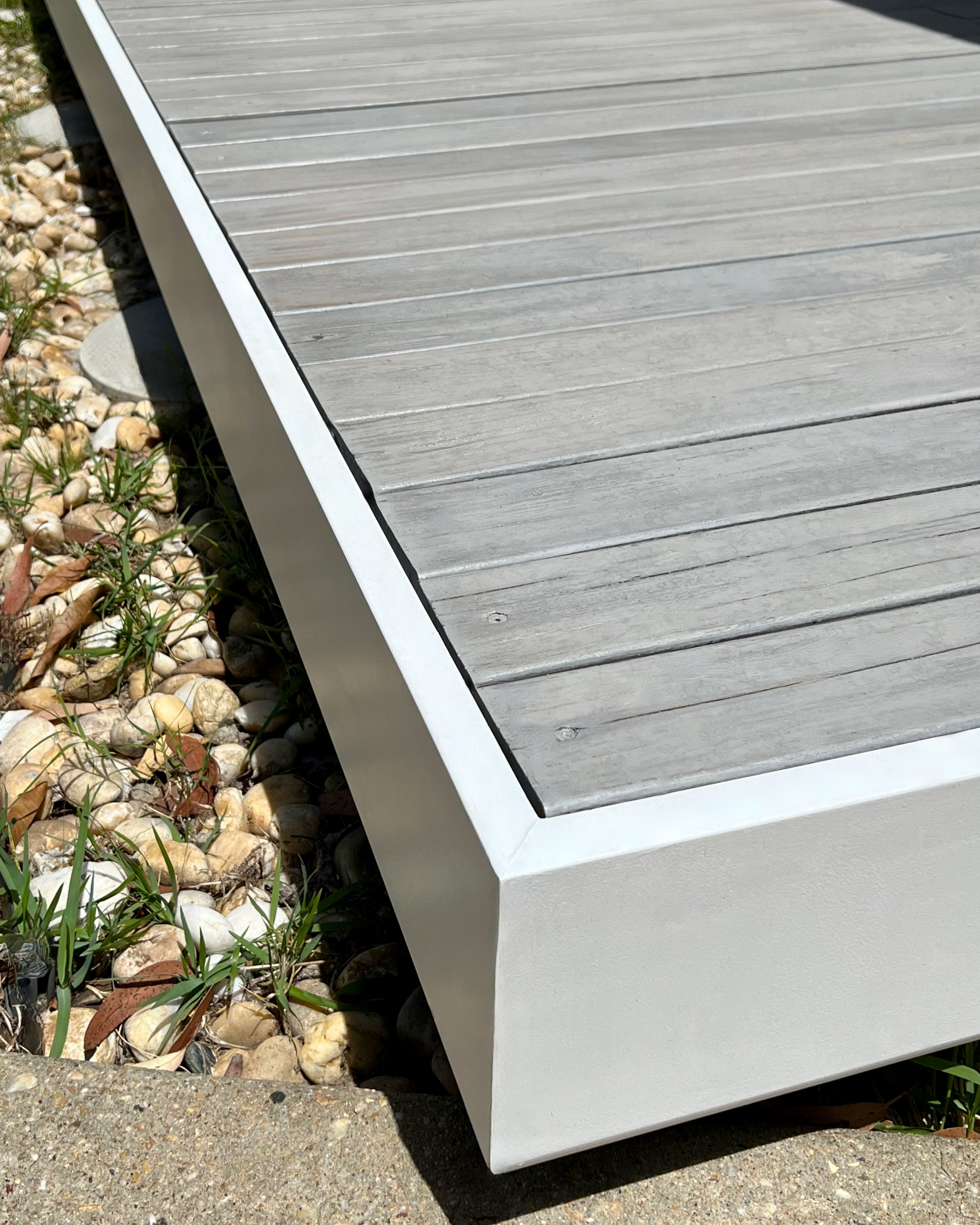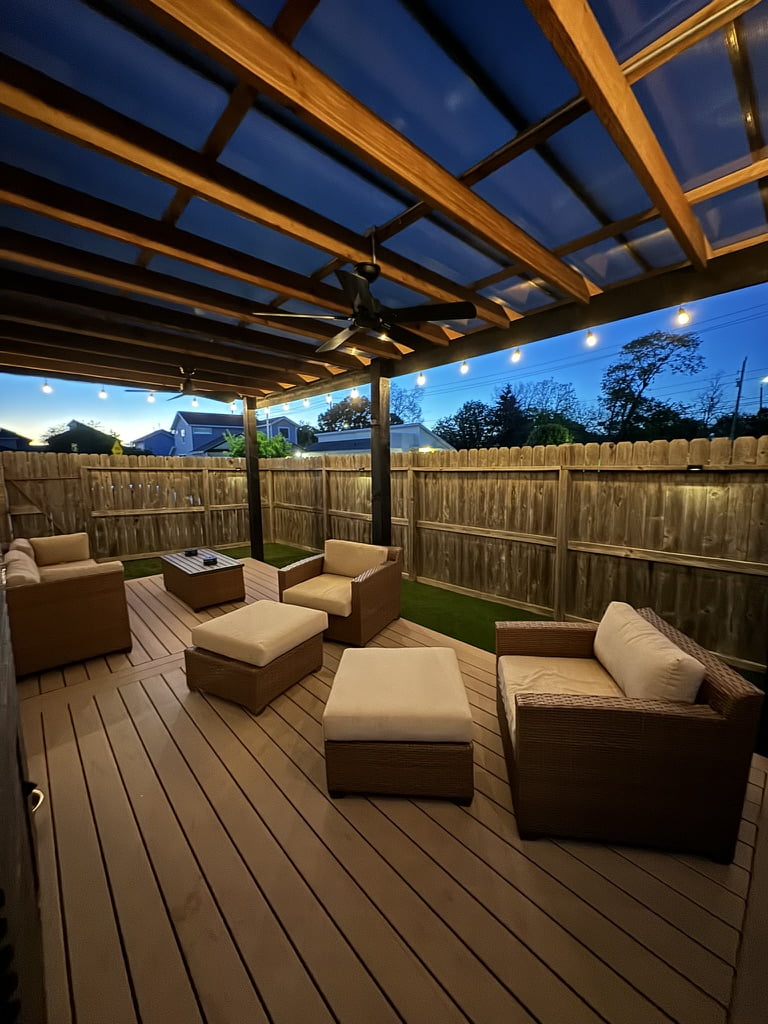From modern to modern styles, deck installation Austin services can match your aesthetic goals.
Exactly how to Select the Right Materials for Your Deck Setup Job
Choosing the suitable products for your deck setup project can appear complicated. There are numerous variables to take into consideration, from resilience and upkeep to visual appeals and ecological impact. The option between standard timber and composite materials, each with its very own collection of advantages and downsides, can be specifically difficult. The key is to stabilize your spending plan, layout preferences, and lifestyle needs to produce a deck that will improve your exterior area for several years ahead.
Understanding the Various Kinds Of Deck Products
When starting a deck installation job, the choice of materials ends up being a pivotal decision. Various choices are available, each with distinct qualities and visual appeal. Standard wood, for example, supplies an ageless, natural look and is generally a lot more cost-efficient. Nonetheless, it can warp with time and requires regular upkeep. Composite products, on the other hand, are a blend of timber and plastic, giving durability and resistance to weather elements. They require less upkeep contrasted to wood but are generally more pricey. One more choice is vinyl, which is essentially maintenance-free and resistant to parasites and rot, albeit much less natural-looking. By comprehending these differences, home owners can make a much more enlightened decision on one of the most suitable deck material for their particular needs.
Examining the Resilience and Upkeep Needs of Deck Products
Examining the durability and upkeep requirements of deck materials is a critical action in deck setup. Longevity entails the material's ability to withstand severe weather conditions, wear and tear, and its durability.
Comprehending maintenance needs is equally vital. Some products need normal sealing or staining to maintain their appearance and stand up to dampness damage, while others, like composite outdoor decking, demand much less upkeep. By assessing these elements, one can pick the most ideal outdoor decking material, guaranteeing an equilibrium between toughness, maintenance requirements, and aesthetic allure.
Expense Evaluation: Contrasting Timber and Compound Decking
Although price may originally look like a second issue, it is a substantial element when contrasting wood and composite outdoor decking. Timber, usually a much less expensive option, has a lower upfront expense. Over time, upkeep expenditures can gather, possibly making wood a lot more pricey in the long run. These maintenance prices might consist of staining, sealing, or changing harmed boards. On the various other hand, composite decking, while pricier originally, calls for less maintenance, potentially reducing long-term costs. Yet, it's crucial to keep in mind that composite outdoor decking isn't unsusceptible deterioration, and replacement expenses can be high. Potential deck proprietors should consider their spending plan and desire to maintain their decks when choosing in between timber and composite outdoor decking.
Looks and Layout Flexibility of Decking Products
All-natural wood decking offers a timeless, classic appearance, while composite materials supply a wide range of shades and textures to match diverse tastes and designs. Composite products, while less flexible in design, are still versatile enough for the majority of deck designs. These variables, consequently, are critical determinants in the selection of outdoor decking product.
Environmental Impact of Decking Products
When picking outdoor decking products, one have to take into consideration not only appearances and longevity, but additionally the ecological effect. It's crucial to analyze the sustainability of products and check out recycled decking options. Recognizing the prospective effect on local ecological communities will certainly ensure a much more eco responsible selection.
Analyzing Material Sustainability
In the world of deck building and construction, evaluating product sustainability is a crucial step. This includes assessing the ecological effect of each potential material, thinking about variables such as the energy required for its manufacturing, its carbon footprint, and its end-of-life disposal or reusing alternatives. As an example, wood is a renewable energy, however unsustainable logging methods can lead to deforestation. Additionally, composite outdoor decking materials frequently incorporate wood and plastic, reducing the need for brand-new lumber but boosting reliance on fossil gas. Light weight aluminum and various other steels might be a lot more durable and recyclable, yet their removal and processing can be energy-intensive. Therefore, the selection of decking materials must stabilize performance, visual appeals, expense, and sustainability to guarantee an accountable and resilient installment.
Recycled Outdoor Decking Alternatives

Compound outdoor decking is especially prominent as a result of its longevity and ease of upkeep. It's immune to rot, bugs, and fading, making it a long-lasting alternative. Recycled plastic outdoor decking, on the other hand, is highly durable and needs marginal maintenance. While these products may carry a greater initial price, their durability and minimized environmental effect make them a wise financial investment for the eco-conscious house owner.

Effect On Local Ecosystems
While the advantages of making use of recycled products for decking can not be overemphasized, it's similarly crucial to consider the more comprehensive environmental ramifications of these selections. The extraction, processing, and transport of products can exceptionally impact local ecosystems. Deforestation for lumber outdoor decking adds to habitat loss and environment change. Also the manufacturing of composite products can release harmful emissions. On the other hand, utilizing recycled or sustainably sourced products can aid reduce these results. Additionally, considering the life expectancy of materials can reduce environmental influence; longer-lasting choices need less constant substitute, hence saving sources. Appropriate disposal of old decking is essential to reducing landfill waste. Essentially, an eco-conscious deck project demands careful material selection, lasting sourcing, and liable disposal.
Making Your Final Decision: Tips for Choosing the Finest Deck Products
As the short article transitions right into the subtopic of "Making Your Decision: Tips for Choosing the Finest Deck Products", it is vital to understand the selection of deck products offered. Striking an equilibrium between sturdiness and appearance is vital in this option process. The following get more discussion will direct readers in making an informed choice based on these crucial considerations.
Comprehending Various Deck Materials
The task of selecting the appropriate materials for your deck installment can seem daunting as a result of the huge array of alternatives offered. Nevertheless, recognizing the different materials can simplify this process. Wood is a popular More Bonuses choice, supplying a timeless aesthetic and price. Kinds of timber made use of consist of pressure-treated lumber, cedar, and redwood. Composite products, made from a blend of wood and plastic, are low-maintenance and immune to rot and pests. Vinyl or PVC decks are a lot more long lasting and require less maintenance than composite materials, yet they can look much less natural. Light weight aluminum decks are solid, lightweight, and resistant to rot, however they are also the most expensive choice. Each product has its very own benefits and drawbacks, making it vital to consider your certain demands before making a final decision.
Longevity vs. Visual Appeals Equilibrium
Balancing sturdiness with appearances can be a difficulty when choosing deck materials - deck installation. High-traffic locations might require durable materials like composite outdoor decking, which endures wear and tear however may do not have the all-natural appeal of wood. House owners require to strike an equilibrium, considering both the deck's functional needs and their aesthetic choices.
Final thought
Finally, choosing the ideal products for your deck installation job needs mindful factor to consider of aspects such as toughness, upkeep, expense, aesthetics, and ecological influence. Whether you decide for traditional timber or composite materials, your selection should straighten with your spending plan, design preferences, and lifestyle. Inevitably, the best outdoor decking material is one that improves your outside area and gives pleasure for several years ahead.